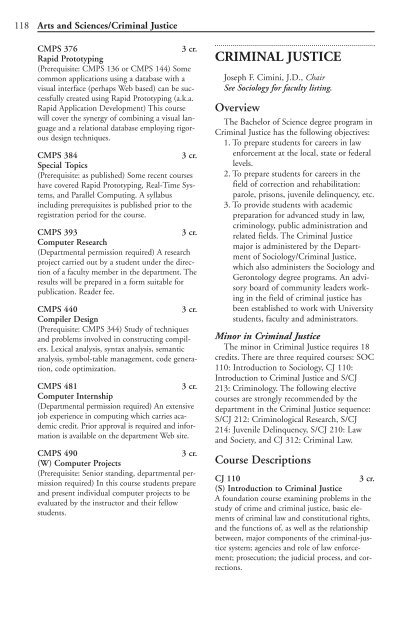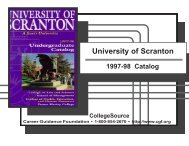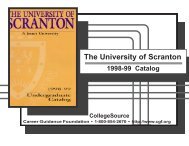2003-2004 - The University of Scranton
2003-2004 - The University of Scranton
2003-2004 - The University of Scranton
Create successful ePaper yourself
Turn your PDF publications into a flip-book with our unique Google optimized e-Paper software.
118 Arts and Sciences/Criminal Justice<br />
CMPS 376 3 cr.<br />
Rapid Prototyping<br />
(Prerequisite: CMPS 136 or CMPS 144) Some<br />
common applications using a database with a<br />
visual interface (perhaps Web based) can be successfully<br />
created using Rapid Prototyping (a.k.a.<br />
Rapid Application Development) This course<br />
will cover the synergy <strong>of</strong> combining a visual language<br />
and a relational database employing rigorous<br />
design techniques.<br />
CMPS 384 3 cr.<br />
Special Topics<br />
(Prerequisite: as published) Some recent courses<br />
have covered Rapid Prototyping, Real-Time Systems,<br />
and Parallel Computing. A syllabus<br />
including prerequisites is published prior to the<br />
registration period for the course.<br />
CMPS 393 3 cr.<br />
Computer Research<br />
(Departmental permission required) A research<br />
project carried out by a student under the direction<br />
<strong>of</strong> a faculty member in the department. <strong>The</strong><br />
results will be prepared in a form suitable for<br />
publication. Reader fee.<br />
CMPS 440 3 cr.<br />
Compiler Design<br />
(Prerequisite: CMPS 344) Study <strong>of</strong> techniques<br />
and problems involved in constructing compilers.<br />
Lexical analysis, syntax analysis, semantic<br />
analysis, symbol-table management, code generation,<br />
code optimization.<br />
CMPS 481 3 cr.<br />
Computer Internship<br />
(Departmental permission required) An extensive<br />
job experience in computing which carries academic<br />
credit. Prior approval is required and information<br />
is available on the department Web site.<br />
CMPS 490 3 cr.<br />
(W) Computer Projects<br />
(Prerequisite: Senior standing, departmental permission<br />
required) In this course students prepare<br />
and present individual computer projects to be<br />
evaluated by the instructor and their fellow<br />
students.<br />
CRIMINAL JUSTICE<br />
Joseph F. Cimini, J.D., Chair<br />
See Sociology for faculty listing.<br />
Overview<br />
<strong>The</strong> Bachelor <strong>of</strong> Science degree program in<br />
Criminal Justice has the following objectives:<br />
1. To prepare students for careers in law<br />
enforcement at the local, state or federal<br />
levels.<br />
2. To prepare students for careers in the<br />
field <strong>of</strong> correction and rehabilitation:<br />
parole, prisons, juvenile delinquency, etc.<br />
3. To provide students with academic<br />
preparation for advanced study in law,<br />
criminology, public administration and<br />
related fields. <strong>The</strong> Criminal Justice<br />
major is administered by the Department<br />
<strong>of</strong> Sociology/Criminal Justice,<br />
which also administers the Sociology and<br />
Gerontology degree programs. An advisory<br />
board <strong>of</strong> community leaders working<br />
in the field <strong>of</strong> criminal justice has<br />
been established to work with <strong>University</strong><br />
students, faculty and administrators.<br />
Minor in Criminal Justice<br />
<strong>The</strong> minor in Criminal Justice requires 18<br />
credits. <strong>The</strong>re are three required courses: SOC<br />
110: Introduction to Sociology, CJ 110:<br />
Introduction to Criminal Justice and S/CJ<br />
213: Criminology. <strong>The</strong> following elective<br />
courses are strongly recommended by the<br />
department in the Criminal Justice sequence:<br />
S/CJ 212: Criminological Research, S/CJ<br />
214: Juvenile Delinquency, S/CJ 210: Law<br />
and Society, and CJ 312: Criminal Law.<br />
Course Descriptions<br />
CJ 110 3 cr.<br />
(S) Introduction to Criminal Justice<br />
A foundation course examining problems in the<br />
study <strong>of</strong> crime and criminal justice, basic elements<br />
<strong>of</strong> criminal law and constitutional rights,<br />
and the functions <strong>of</strong>, as well as the relationship<br />
between, major components <strong>of</strong> the criminal-justice<br />
system; agencies and role <strong>of</strong> law enforcement;<br />
prosecution; the judicial process, and corrections.
















